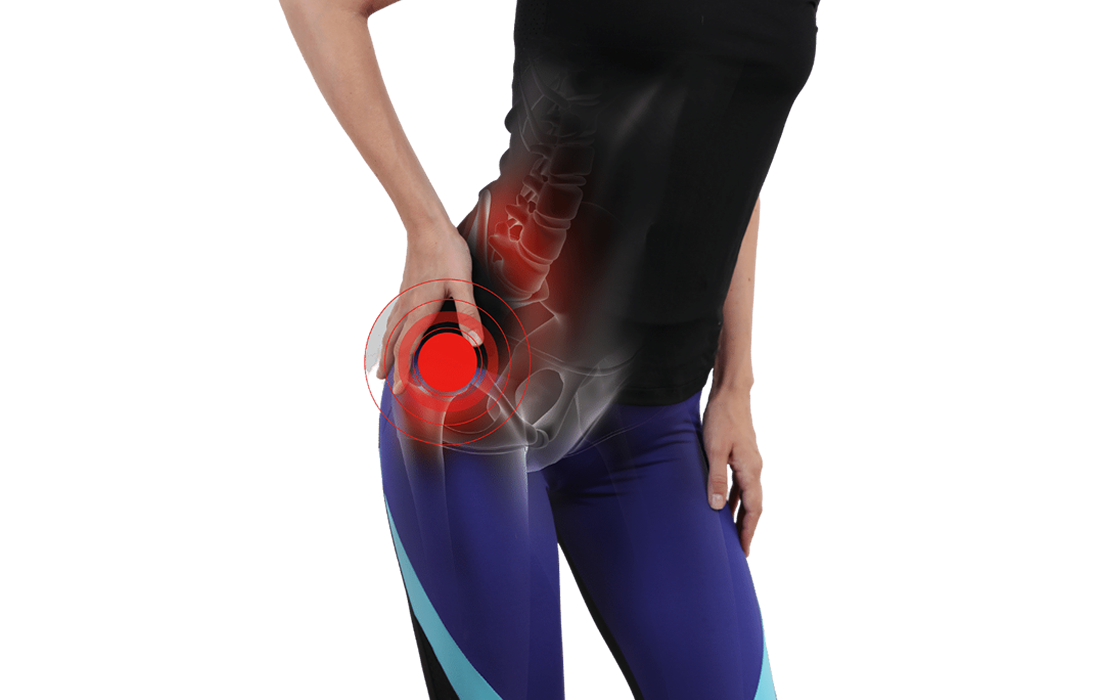Platelet-Rich Plasma
Platelet Rich Plasma for Hip Bursitis
What is Hip Bursitis?
Bursitis is a painful condition that affects the small, fluid-filled sacs, called bursae, that cushion the bones, tendons, and muscles near the joints. It occurs when the bursae become inflamed.
The most common locations are the shoulder, elbow, and hip. They are normally presented in joints that perform frequent repetitive movements.
What Causes Hip Bursitis?
The most common causes of bursitis are repetitive motions or positions that put pressure on the bursae around the joint. In the case of the hip, some examples include: play or work activities that cause overuse or injury to the joint area, such as running upstairs, climbing, or standing for long periods of time, incorrect posture, and injury to the point of the hip, such as falling onto the hip, bumping the hip to an object, or lying on one side of the body for an extender period.
Signs and Symptoms
- Pain on the outside of the hip and thigh or in the buttock.
- Pain when lying on the affected side.
- Pain when you press in or on the outside of the hip.
- Pain that worsens during activities such as getting up from a deep chair or getting out of the car.
Current Treatment Options
Treatment goals include reducing pain and inflammation, preserving mobility, and preventing disability and recurrence.
Some recommendations may include a combination of rest, splints, heat, and cold application, but more advanced treatment options include the use of medications, such as non-steroidal anti-inflammatory drugs, corticosteroid joint injections, physical activity, and surgery.
Chronic hip bursitis is a common yet difficult condition to treat successfully.
New Study on PRP Injections
In the study, “Platelet-Rich Plasma (PRP) More Effective than Cortisone for Severe Chronic Hip Bursitis”, 40 patients were selected and randomly divided into 2 groups: one group was treated with a single injection of 40 milligrams of methylprednisolone, and a second group with a single injection of PRP.
The researchers recorded the results using the Harris Hip Score (HHS), which assesses a patient’s functionality before and after hip treatment. They also used the Western Ontario and McMaster Universities Arthritis Index (WOMAC), which measures pain, stiffness, and functional limitation.
The first group had average HHS scores of 50.5 and WOMAC scores of 58.3, the second group of 51.7 (HHS) and 58.8 (WOMAC).
After three months the patients that received the cortisone shots reported an HHS score of 75.4 and WOMAC of 83.6, while the PRP patients reported 84.2 (HHS) and 91.4 (WOMAC). Also, the PRP patient’s scores remained high after one year of treatment.
According to the authors of the study, PRP injections are significantly more effective and durable than cortisone injections for the treatment of hip bursitis.
Sources:
American Academy of Orthopaedic Surgeons. “Platelet-rich plasma treatment more effective than cortisone for severe hip bursitis.” ScienceDaily. ScienceDaily, 14 March 2014. <www.sciencedaily.com/releases/2014/03/140314093747.htm>.
https://www.mayoclinic.org/diseases-conditions/bursitis/symptoms-causes/syc-20353242
https://my.clevelandclinic.org/health/diseases/4964-trochanteric-bursitis
Image from:
https://www.baycityhealth.com.au/hip-pain

